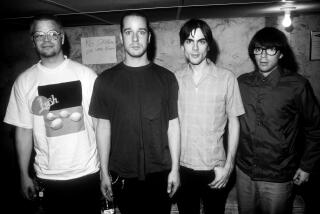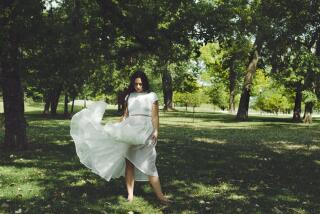The waiting
SAN FRANCISCO — THE misadventure began, as so many do, in a dingy Florida strip club. This one was called Dub’s, and it was cinder-block roadhouse in Gainesville where, in the early 1970s, a dancer named Bubbles shimmied for students, townies and truck drivers while a band with the unfortunate name of Mudcrutch played muscular music that melded old-man country with new-kid rock. It was a Southern solution to the British Invasion.
Mudcrutch was better than good too. They did five shows a day, six nights a week and, by all accounts, they were the second most interesting thing on stage. Everyone predicted the scruffy kids would be stars someday. That didn’t happen, at least not the way anyone expected.
The young band headed west to L.A. and cut a single, but the record fell flat. Mudcrutch was one and done, so, 33 years ago, the members called it quits.
The story should end there, but it doesn’t. They have a new album -- their debut album, in fact -- hitting stores Tuesday from Reprise Records. They are on tour too and have six sold-out nights booked at the Troubadour after a recent run at the Fillmore in San Francisco, despite never having been played on the radio.
The reason for all this? The band’s lead singer and bassist is Tom Petty, who of course became one of the signature rock stars of his generation as well as one of its maverick souls. Now one of the great things about being a rock star is watching your whims come to life, and that’s exactly what happened when Petty decided last year, against all logic, that Mudcrutch should live again.
“You wouldn’t exactly call it a career move, would you?” Petty says as he doodles on a pad of Clift Hotel stationery. He was sketching a picture of the man sitting across from him, Tom Leadon, Petty’s childhood friend and fellow Mudcrutch founder. “What this is all about is the music. Being in this band is so much fun, there’s something pure about it.”
Petty was speaking with nostalgic endearment, but the expression on Leadon’s face was the kind you see in snapshots of wide-eyed lottery winners. “When Tom called and said he wanted to get the band together,” Leadon says, “I felt like a bolt of lightning went through my body.”
Leadon was headed home with a carload of groceries on a Saturday morning last year when his cellphone rang and he heard a voice -- it sure sounded like his old buddy Petty -- on the other end talking about a Mudcrutch reunion. He thought it was a prank.
Leadon has been a music teacher outside Nashville in recent years, while the drummer in Mudcrutch, Randall Marsh, was teaching drums back home in Florida. Marsh’s old roommate back in the Gainesville days, Mike Campbell, is on guitar and is familiar to Petty fans as the “co-captain” of the star’s more familiar band, the Rock and Roll Hall of Fame-honored Heartbreakers. The four original Mudcrutch members are also joined this time around by Benmont Tench, the Heartbreakers keyboardist who also grew up in Gainesville and, being a bit younger than the others, remembers watching Mudcrutch up on stage with an opening act from nearby Jacksonville, a band called Lynyrd Skynyrd.
“I watched Mudcrutch play ‘Dizzy Miss Lizzie,’ and I remember thinking, ‘Who are these guys? They’re great!’ ”
No mere trivial pursuit
Tench eventually sat in with a later version of Mudcrutch. But even with all that talent, the band wound up nothing more than a record-store trivia answer, just like the Warlocks and the Quarrymen and other names that fall into the category of footnote. The whole reunion thing reeks of stunt -- until you listen to the album, see them on stage and hear them talk about their band heritage.
The album, titled simply “Mudcrutch,” has more swamp, stomp and twang than records that made the Heartbreakers famous, and there’s a dappled, Southern psychedelic feel to parts of it -- especially the epic “Crystal River,” which the band performed only once in the studio and has presented without overdubs or tinkering.
“There are no ornaments,” Campbell says of the music. “We performed without headphones in the studio, all live takes, playing in a circle.”
The revelation in the music is hearing Petty share vocals with Leadon. The pair, as teens, learned to sing and play together, Petty says, and each “can predict the phrasing and tone” the other is thinking of when they stand side by side. It’s no coincidence that two cover songs on the album come from the Byrds (“Lover of the Bayou”) and Flying Burrito Brothers (“Six Days on the Road”) because Gram Parsons and Chris Hillman were the compasses that always pointed to musical south and west for Mudcrutch.
Leadon’s brother Chris had been west and brought back the first album by the Burrito Brothers, which was like a dispatch from an alien planet to kids in Gainesville. Another brother, Bernie, went to find a place in the Southern California scene. He ended up playing in the Burrito Brothers and then the Eagles.
“All of it ties together; Gram was from Florida too,” Tench points out. Sitting at the Clift, the five members finish one another’s sentences and veer off into tales of the old days, when the band members shared a four-bedroom house on the Santa Fe River in a sleepy area called Earleton just outside of Gainesville.
“We didn’t have a TV, but in the living room we had a record player set up between two big guitar amps, and we each got to pick an album and put it on and everyone would sit and listen and discuss it,” Petty says. “And I mean, we really listened and that was our music education. Randall would put on a Hendrix album, Tom might bring Doc Watson, Mike might have Chet Atkins. . . . “
Then there were Mudcrutch Farm Festival shows, a part of Gainesville lore to this day; the series of guerrilla shows at a farmhouse pulled in 1,000 or more kids. They came for a singular sound in the region: Parson’s cosmic cowboy dreams with the added snap of British Invasion music and a swagger of the band’s own personality. “We were good, man,” Petty says, “and that wasn’t a secret.”
Looking back, looking forward
At the Fillmore, the band was getting ready for its second night and Petty was fretting about the stage smoke puffing into the venue during sound check. “You can’t sing after breathing in too much of this stuff,” Petty says. “The Heartbreakers played here one time and some guy in the crowd shot out some pepper spray. We had to stop the show.”
Petty smiles as he tells the tale, in good spirits. The band had just found out that Rolling Stone had given its album four out of five stars with reviewer Will Hermes adding that “the songs are mythic Americana” and the band “gets within spitting distance of genre classics like ‘Sweetheart of the Rodeo,’ ‘The Gilded Palace of Sin’ and ‘American Beauty.’ ”
Petty has been game for plenty of collaborative experiments in the past, most notably his membership as the youngest member in the all-star collective called the Traveling Wilburys. That time he was standing next to Dylan, Roy Orbison, George Harrison and Jeff Lynne, but this time he is the lone big name on the marquee. There’s no expectation that Mudcrutch will be a major commercial force in the current anemic marketplace, but Leadon says he hopes a strong critical showing and positive vibe will keep open the option for future endeavors.
For this effort, just like the old days, the band members got together in one house -- except this time it was Petty’s spread up in Malibu, which not only has a television but two tennis courts.
Petty says he came to Day One of the Mudcrutch revival with four new songs and plenty of uncertainty -- but not a lot of anxiety. Everyone in the room had been interviewed for the 2007 documentary “Runnin’ Down a Dream,” Peter Bogdanovich’s comprehensive documentary of Petty’s life and music. That process and that film brought a reflective spirit to the reunion and also broke the ice, emotionally speaking.
If there were any lingering subplots about success, resentment and what might have been, they haven’t shown up yet. As Marsh notes, “we’re old friends and if it didn’t work out, that’s OK, we would still have fun.”
The band recorded four songs the first day. Petty was scrambling to keep up with the appetite for material, and no one was prepared for the energy of the experience. They eventually began talking about a brief tour, of all things.
Back at the Fillmore, Petty sits on the lip of the stage, talking to Leadon about the changing nature of alligators in Florida. The creatures were sleepy and slow to bite back when the two were boys; now it’s changing. “It ain’t like it used to be,” Petty says, “It’s not safe to hang around the water’s edge. You might just get bit.”
The shows at the Troubadour will be a sweet engagement for Mudcrutch, which will soon give way to a Heartbreakers tour. Petty has long thought of the Heartbreakers as an L.A. band, but he and his old buddies have a flash of Florida pride in them. All of them were surprised when Southern California didn’t jump at the chance to make the band famous back in 1974 when Mudcrutch first hit town.
The fans in San Francisco cheered madly for Mudcrutch even though they didn’t know the words to the songs. Petty and company could have hedged their bets and tossed in a Heartbreaker hit or two just to goose the audience, but in a classy move they chose to stand on the new material. They did toss in a few covers -- Bob Dylan’s stoner anthem “Rainy Day Women #12 and 35” and Eddie Cochran’s “Summertime Blues,” which they learned on the fly in a hotel room with two acoustic guitars and a cheap keyboard, Tench notes with a wide smile.
The Mudcrutch reunion is moving forward with all the stress you might find at a pickup game of hoops between old friends. During one long exchange about the old days, the pals debate the competing charms of the strippers at Dub’s and laugh long and hard about some old escapades not fit for a family paper.
At the end, Petty, bearded these days, was asked if he had a great secret motive in reuniting a band that he remembered but his fans didn’t. He smiles and shrugs. “I decided to trust my gut instinct which told me, ‘Do something fun.’ ”
The interview was over and the band got up to go, but before they did, Leadon reached over, picked up the sketch of himself that Petty had drawn and asked him to sign it.
--
More to Read
The biggest entertainment stories
Get our big stories about Hollywood, film, television, music, arts, culture and more right in your inbox as soon as they publish.
You may occasionally receive promotional content from the Los Angeles Times.










